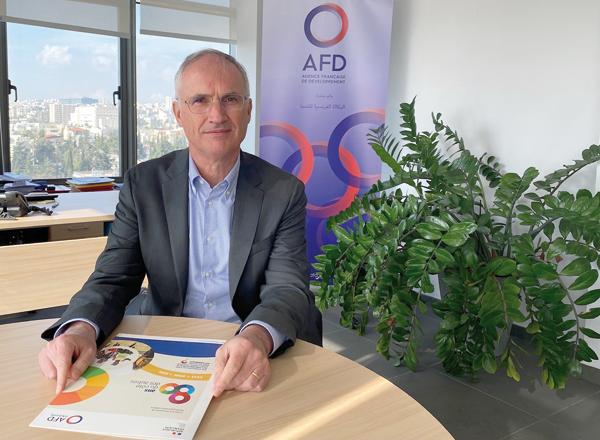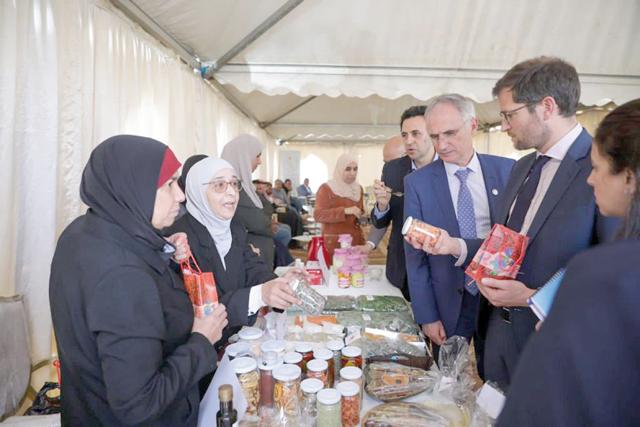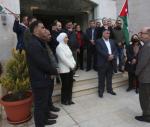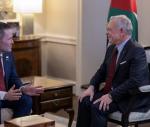You are here
Support for Jordan’s water sector a top priority — AFD
By Batool Ghaith - Jan 04,2022 - Last updated at Jan 04,2022

Laurent Duriez (Photo courtesy of AFD)
AMMAN — Eighty per cent of the population in Jordan has benefited from improved access to water and a more regular supply thanks to the funded projects by the French Development Agency (AFD).
The AFD, in a statement, indicated that it has been supporting the Ministry of Water and Irrigation and its two authorities, the Water Authority of Jordan and the Jordan Valley Authority, through technical and financial assistance since 2006.
According to the agency, besides supporting public water policy reforms, it also contributes to financing large-scale infrastructure projects that increase production, transfer drinking water to inhabited regions and treat waste water.
Thanks to the Disi project, which is supported by the AFD, the duration of water distribution in Amman has risen from 45 hours a week to 60 hours, the AFD stated.
Laurent Duriez, the director of AFD Amman office, emphasised that the agency always aims to “stand by its partners and work by their side in order to promote broader agendas, especially regarding climate change”.
The AFD has established itself as a major partner in the cooperation landscape during the 15 years of operation in Jordan, he said.
“Our activities principally focus on two main themes, the management of natural constraints [water and energy] and economic and social development [support for local and urban development],” Duriez said.
“Water is a big priority for Jordan due to water scarcity; it is a social dimension which is of high importance for us. The AFD supports a number of water projects in Jordan and we are looking forward to working on the National Conveyance Project in 2022,” Duriez told The Jordan Times during an interview.
Duriez noted that the AFD is also involved in supporting renewable energy projects in Jordan. An ambitious policy for energy efficiency and renewable energy development has been implemented to achieve the country’s energy transition, in addition to its contribution to achieving the sustainable development goals, he said.
According to the AFD statement, this policy helps foster the country’s energy independence and reduce the cost of its hydrocarbon imports, which limits the impact of the revaluation of energy prices on households.
“In Jordan, the AFD finances solar and wind renewable energy projects and energy efficiency projects, it also strengthens distribution infrastructure and supports public policy reforms as part of the climate change agenda,” Duriezsaid.
Duriez indicated that the AFD is collaborating with the National Electric Power Company (NEPCO) to bring energy from the south of Jordan to the capital Amman, describing it as “a green corridor as a transmission line”, which was finalised by the end of 2021.
As per the AFD statement, 25 per cent of the country’s total renewable energy capacity, i.e. 141 MW, has been co-financed by the agency.
The AFD added that the Kingdom’s economic growth is unevenly distributed and is combined with development gaps between regions and municipalities. The Jordanian government has set out to reduce these economic disparities on its territory by conducting a local development policy to strengthen municipal governance and public service provision, with a focus on public transport, the statement said.
Duriez noted that the AFD finances transport infrastructure projects both at national and municipal levels.
“We are also supporting public policy reform in this sector. A hundred per cent of municipalities have benefitted from the municipal small-scale investments programme,” he said.
The agency also supports the agriculture sector to make the workers more socially included, and there are two new agricultural projects which will be financed and supposedly start before the end of 2022 in Jordan, according to Duriez.
“The AFD works on supporting projects for access to employment through vocational training for vulnerable populations. Our projects contribute to the resilience of all vulnerable populations whether host communities or refugees,” Duriez added.
The AFD has co-financed and contributed a total amount of 1.015 billion euros to its commitments between 2016 and 2021, the statement said.
According to the AFD, the Ramtha wastewater project with the Water Authority of Jordan will install an additional 100km of water networks and four pumping stations that will extend the existing collection sewer system from 140km to 240km.
Duriez also noted that the AFD will fund the development policy loan (DPL) to support Gender Responsive Budgeting (GRB) in Jordan, allocating a loan of 150 million euros.
“The project aims to reduce inequalities between women and men in the planning, programming, budgeting of public policies through the implementation of GRB in Jordan,” he said.
According to the AFD, Jordan has recently strengthened its strategic corpus for equality between women and men, articulating around a “positive” agenda aiming at reducing inequalities, through amendments to the regulatory framework and specific programme.
Duriez highlighted that the AFD is keen on working to preserve cultural heritage in Jordan as well as at different historical sites and defining the tourism infrastructure.
“There is a good potential for Jordan to become a regional platform, especially in the ICT sector,” Duriez added.
“For the year to come, we want to be by the Jordanians’ side, and to build a better future. Jordanians are very open and Jordan is a welcoming country. The AFD is keen to develop its partnership with Jordan through concrete actions,” he said.
Related Articles
AMMAN — The International Union for Conservation of Nature (IUCN) on Monday launched the Smart DESERT project’s activities that aim to impro
Business and households wishing to install photovoltaic systems to generate electricity will find it easier to do so under an initiative launched by the French Development Agency (AFD) on Wednesday.
AMMAN — A delegation from the French Development Agency (AFD) was briefed on the Smart DESERT Project Activities in the agricultural sector















